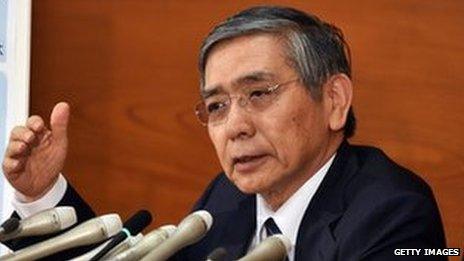Bank of Japan expands monetary stimulus measure
- Published

Japan's central bank has surprised markets by announcing an expansion of its monetary stimulus policy.
The Bank of Japan said it would increase its asset buying programme to 80 trillion yen ($726bn; £454bn) a year, up from the previous rate of 60-70 trillion yen.
Japan's economy is currently seeing weak growth and easing consumer prices.
The BOJ's move pushed the Nikkei share index up 4.8% to 16,413.76, its highest close for nearly seven years.
On the currency markets, the dollar rose 1.2% to 110.68 yen, the highest rate since January 2008.
The bank's decision to increase its stimulus measure comes in the same week that the US Federal Reserve ended its policy of quantitative easing.
'Critical moment'
The BOJ's move was made amid weak domestic demand following an April sales tax hike, and concerns that lower oil prices would affect consumer prices.
At a news conference following the central bank's meeting, BOJ governor Haruhiko Kuroda said it was a "critical moment for Japan to emerge from deflation".
The bank's programme is designed to stimulate the world's third largest economy by encouraging more lending, which in turn should see consumers spending more.
It also hopes to drive greater investment activity and boost inflation.
Japan has struggled with deflation, or falling prices, for more than 15 years - a situation which has led to stagnant economic growth.
Private consumption makes up some 60% of Japan's economic activity and deflation trends in the country have seen consumers hold onto their money in the hope of even lower prices later on.
A sales tax hike made in April may have had an adverse impact on the economy, too, hurting the nation's purchasing power.
In the April-to-June period, official data showed Japan's economy had contracted by 1.7%, compared to the earlier quarter.
Data released earlier on Friday showed that the nation's household spending had fallen more than expected in September and that annual core consumer inflation, stripping out the effects of April's sales tax, was 1.0%.
The BOJ's inflation target is 2%.
Cheaper prices
Mr Kuroda said that the bank's decision made today showed an "unwavering determination to end deflation".
The Friday afternoon announcement saw the yen fall against all its major peers, a result that Mr Kuroda said was positive for the nation's economy.
"When you look at underlying moves, not just oil but various commodity and food prices are falling," he said.
"That is offsetting some of the upward pressure on prices (from the weak yen)."
A weaker yen also helps Japan's exporters as it helps bring down the cost of Japanese goods sold abroad.
The BOJ's board only voted 5-4 in favour of the stimulus increase, and Mr Kuroda said there had been some doubt about whether it was appropriate to take additional steps.
"For now, I think we've done enough to respond to risks," he said.
- Published29 October 2014
- Published22 October 2014
- Published8 October 2014
- Published26 July 2023